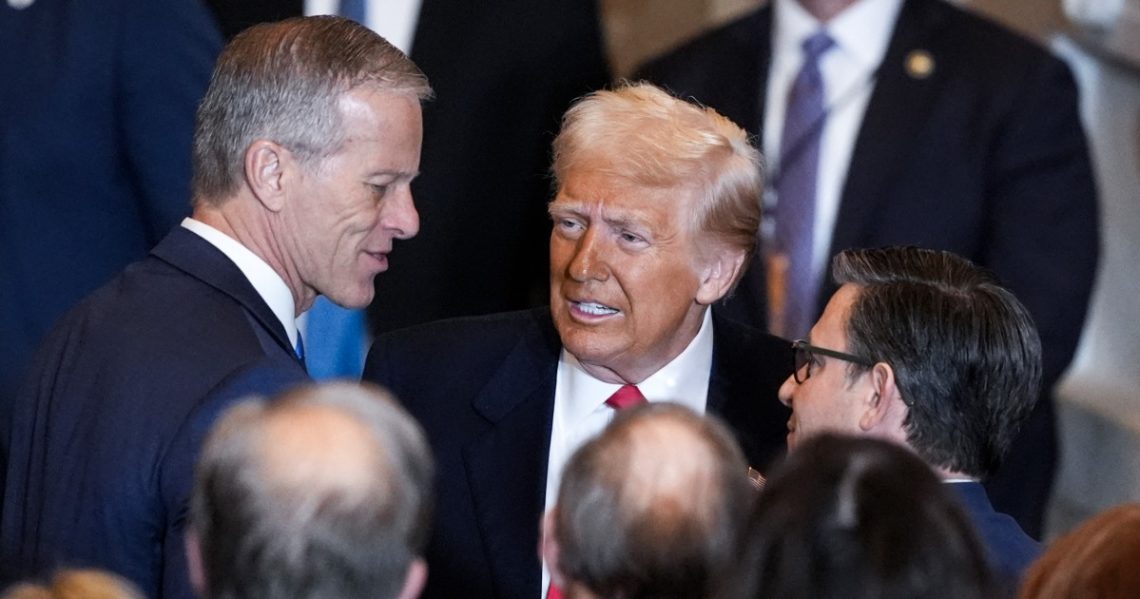WASHINGTON — President Donald Trump is pushing Senate Republicans to abolish the 60-vote filibuster rule in order to reopen the shuttered government without Democratic votes.
But in a rarity for the president, he’s hitting firm and immediate resistance from his own party.
“It is now time for the Republicans to play their ‘TRUMP CARD,’ and go for what is called the Nuclear Option — Get rid of the Filibuster, and get rid of it, NOW!” he wrote in a pair of late-night social media posts Thursday. “Well, now WE are in power, and if we did what we should be doing, it would IMMEDIATELY end this ridiculous, Country destroying ‘SHUT DOWN.’”
Senate Republican leaders have been outspoken in their support for the 60-vote rule to pass most bills. The new Majority Leader, John Thune, R-S.D., promised shortly after the 2024 election that the legislative filibuster would remain unchanged on his watch.
“Leader Thune’s position on the importance of the legislative filibuster is unchanged,” Thune spokesman Ryan Wrasse said Friday.
A spokesperson for Senate Majority Whip John Barrasso, R-Wyo., said: “Senator Barrasso’s support of the filibuster is unchanged.”
Sen. John Curtis, R-Utah, posted on X Friday that he was a “firm no” on getting rid of the filibuster.
“The filibuster forces us to find common ground in the Senate,” Curtis said, referring to a headline about Trump’s comments. “Power changes hands, but principles shouldn’t. I’m a firm no on eliminating it.”
Yet the conversation about the filibuster escalated on Capitol Hill even before Trump’s comments after Sen. Bernie Moreno, R-Ohio, appeared on Fox News days into the shutdown and called on his party to eliminate the filibuster.
But various Republicans have voiced opposition to that push, including Moreno’s fellow Ohio senator.
“That’s not a step I think we should take,” Sen. Jon Husted, R-Ohio, told reporters.
Sen. Thom Tillis, R-N.C., who has said he would resign from the Senate on the same day if Republicans abolish the filibuster, said he doesn’t expect it to be nixed. He noted that Trump also called on the GOP to eliminate the 60-vote threshold during his first presidential term in order to pass his agenda.
“We stood firm there,” Tillis said earlier this month. “I can’t imagine anybody changing now.”
Sen. Roger Marshall, R-Kansas, said he “would not be” in favor of weakening the legislative filibuster to pass the funding bill.
“That’s a nonstarter,” he said.
Sen. Markwayne Mullin, R-Okla., said he would “absolutely not” favor abolishing the filibuster.
“If we want to do something very, extremely limited” to “avoid shutdowns in the future, I may consider that,” he said.” But to nuke, to go nuclear into the filibuster — we all know that the Senate goes back and forth, and it’s in our favor when we have the minority.”
The Senate, under the control of both parties, has eliminated the 60-vote threshold to confirm executive branch personnel and federal judges; those require a simple majority of the Senate.
The legislative filibuster has evolved over the years, but since 1975, it has required 60 votes to achieve “cloture” in the Senate and ensure passage of most bills over the minority’s objections. There are exceptions, such as the budget “reconciliation” process that Republicans used to pass Trump’s “big, beautiful bill.” GOP senators have expanded those exceptions this year, but they’ve largely been opposed to fully removing the 60-vote threshold.
That’s because they worry about what a future Democratic-controlled Washington would be able to do without requiring Republican support for legislation.
“The 60 vote threshold has protected this country, and frankly, that’s what I think this last election was largely about,” Thune told reporters on Oct. 10, positing that if Democrats had won, they would have sought to get rid of the filibuster, make D.C. and Puerto Rico states with representation in Congress and expand the Supreme Court. “You’d have abortion on demand, a whole bunch of things that were on that laundry list,” he said.
“There’s always pressure on the filibuster,” the majority leader said. “But I can tell you that the filibuster through the years has been something that’s been a bulwark against a lot of really bad things happening to the country.”
House Speaker Mike Johnson, R-La., said he understands why Senate Republicans want to preserve the filibuster.
“It’s not my call. I don’t have a say in this. It’s a Senate chamber issue. We don’t have that in the House, as you know,” he told reporters on Friday. “But the filibuster has traditionally been viewed as a very important safeguard. If the shoe was on the other foot, I don’t think our team would like it.”
Sen. John Fetterman, D-Pa., one of many Democrats who ran in 2024 on nixing the filibuster, said Republicans should go ahead and “carve it out” for government funding bills.
“We ran on killing the filibuster, and now we love it,” he said. “I support it because it makes it more difficult to shut the government down in the future, and that’s where it’s entirely appropriate. And I don’t want to hear any Democrat clutching their pearls about the filibuster. We all ran on it.”
Democrats have all but dared Republicans to kill the filibuster and fund the government on their own if they don’t want to negotiate to secure bipartisan support. On NBC’s Meet The Press NOW, Rep. Chris DeLuzio, D-Pa., said Republicans “should have” nuked the filibuster if they didn’t want to deal with Democrats on a bill.
In his Thursday posts, Trump noted that Democrats tried in 2022 to smash the 60-vote threshold, in an attempt to pass a sweeping voting rights law. But they failed to secure the majority vote needed to change the rules in the Senate, and the effort fizzled.
“If the Democrats ever came back into power, which would be made easier for them if the Republicans are not using the Great Strength and Policies made available to us by ending the Filibuster, the Democrats will exercise their rights, and it will be done in the first day they take office, regardless of whether or not we do it,” the president added.
Two weeks after his proposal, NBC News asked Moreno if he had made progress convincing his GOP colleagues to nix the filibuster.
“Not yet,” Moreno replied.
The post Trump’s push to nuke the Senate filibuster hits immediate Republican resistance appeared first on NBC News.




